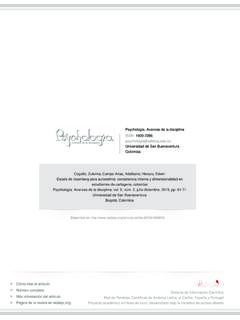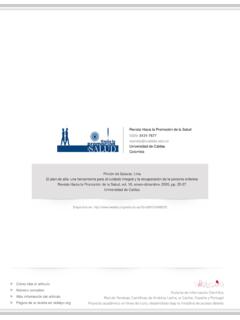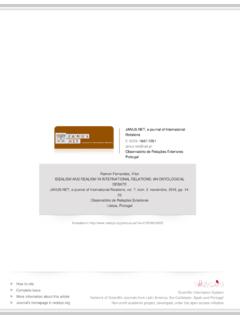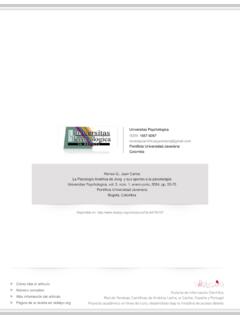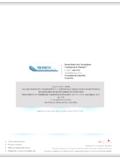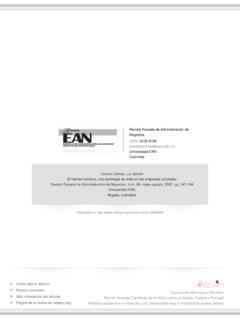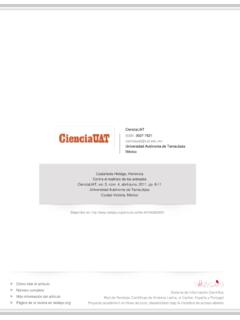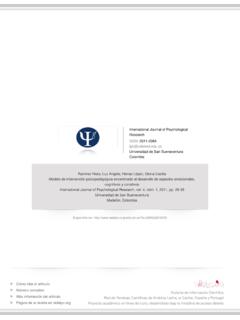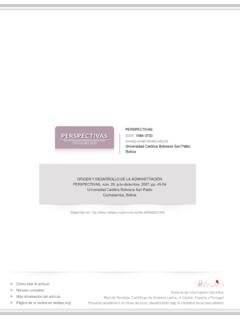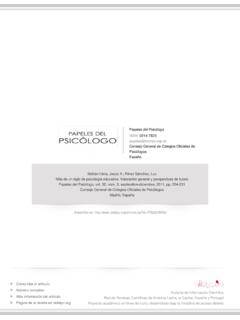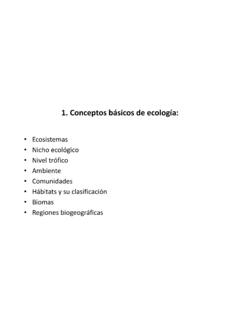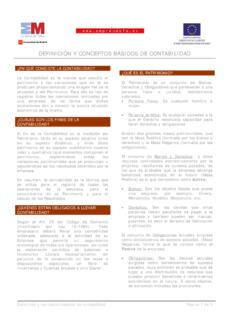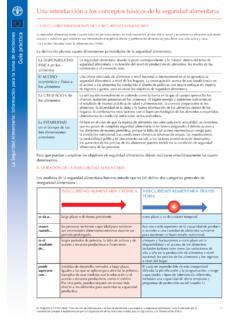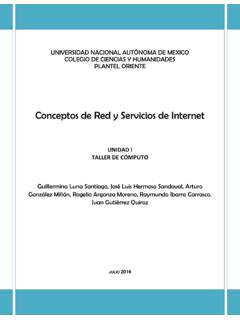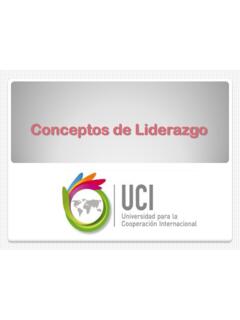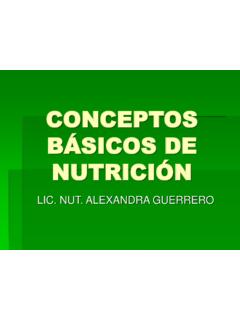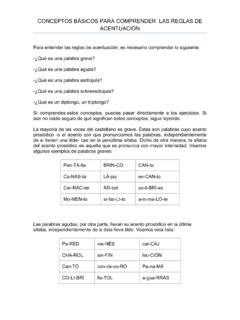Transcription of Redalyc.Conceptos de condicionamiento clásico en los ...
1 Interdisciplinaria ISSN: 0325-8203. Centro Interamericano de Investigaciones Psicol gicas y Ciencias Afines Argentina P rez, Andr s M.; Cruz, Julio Eduardo conceptos de condicionamiento cl sico en los campos b sicos y aplicados Interdisciplinaria, vol. 20, n m. 2, 2003, pp. 205-227. Centro Interamericano de Investigaciones Psicol gicas y Ciencias Afines Buenos Aires, Argentina Disponible en: C mo citar el art culo N mero completo Sistema de Informaci n Cient fica M s informaci n del art culo Red de Revistas Cient ficas de Am rica Latina, el Caribe, Espa a y Portugal P gina de la revista en Proyecto acad mico sin fines de lucro, desarrollado bajo la iniciativa de acceso abierto conceptos DE condicionamiento CL SICO.
2 EN LOS CAMPOS BASICO Y APLICADO *. Andr s M. P rez-Acosta ** y Julio Eduardo Cruz **. Resumen El condicionamiento cl sico, lejos de tener una clara y nica definici n, se presenta en la literatura psicol gica b si- ca bajo m ltiples conceptos basados en diferentes corrientes epistemol gicas, tanto de la psicolog a como de las neuro- ciencias. El objetivo principal de este art culo es presentar un an lisis de la literatura acerca de condicionamiento cl sico con el fin de discernir los conceptos , expl citos o impl citos, tanto en el campo b sico como en el aplicado, el ltimo prin- cipalmente en lo referido a las aplicaciones cl nicas (psicote- rapia).
3 Se detectaron cuatro conceptos bien diferenciados de condicionamiento cl sico: 1) Reflexol gico (original pavlo- viano); 2) Conductista (liderado por Skinner); 3) Cog- noscitivo (liderado por Rescorla); y 4) Neurobiol gico (liderado por Eric R. Kandel). Los dos primeros se refieren m s al condicionamiento cl sico como m todo mientras que los dos ltimos se refieren al condicionamiento cl sico como proceso. En la literatura psicol gica cl nica los conceptos son m s impl citos que expl citos; adem s tales conceptos son m s de tipo reflexol gico o conductista que cognoscitivo o neuro- biol gico.
4 Las aplicaciones detectadas bajo esos conceptos han sido: las terapias aversivas y el recondicionamiento (bajo * El presente trabajo es un producto acad mico del Grupo de Investigaci n dePsicolog a Experimental Aplicada del Departamento de Psicolog a de la Universidad de los Andes. ** PhD en Psicolog a Experimental. Profesor de Planta del Departamento de Psicolog a de la Universidad de los Andes. Apartado de Correos 28802, Bogot - Colombia. E- Mail: ** PhD en Psicolog a Social. Profesor Asociado del Departamento de Psicolog a de la Universidad de los Andes. E-Mail: INTERDISCIPLINARIA, 2003, 20,2, 205-227 205.)
5 P rez-Acosta y Cruz el concepto reflexol gico), las terapias de exposici n (bajo el concepto conductista), la formaci n de preferencias del con- sumidor hacia marcas publicitarias (bajo el concepto cognos- citivo) y el condicionamiento del sistema inmunol gico (bajo el concepto neurobiol gico). A partir de este an lisis concep- tual se sugiere partir siempre de un ejercicio de identificaci n del concepto de condicionamiento cl sico que se va a seguir ,con el fin de efectuar futuras intervenciones, cl nicas o en cualquier otro campo, m s precisas y efectivas. Palabras clave: condicionamiento cl sico - an lisis concep- tual - psicoterapia - reflexolog a - an lisis experimental del comportamiento - psicolog a cognoscitiva - neurobiolog a.
6 Abstract Classical conditioning, far from have a clear and unique definition, appears in basic psychology literature under multiple concepts based on different epistemological streams, as much of psychology as of neurosciences. The main goal of this article is to make an analysis of literature on classical conditioning with the purpose of discerning the concepts, explicit or implicit, as much in the basic field as in the applied one, the last one mainly referred to clinical applications (psycotherapy). Four different concepts of classical conditioning were detected: 1) Reflexological (Pavlovian original concept), 2) Behaviorist (led by Skinner), 3).
7 Cognitive (led by Rescorla), and 4) Neurobiological (led by Eric R. Kandel). Both, the first and the second, refer about classical conditioning like a method whereas both, the third and the fourth, refer about classical conditioning like a process. In clinical psychology literature the concepts are more implicit than explicit; in addition, such concepts are more reflexological or behaviorist ones than cognitive or neurobiological ones. The applications detected under those concepts have been: the aversive therapies and the reconditioning (under the reflexological concept); the exposition therapies (under the behaviorist concept).
8 206 INTERDISCIPLINARIA, 2003, 20,2, 205-227. conceptos de condicionamiento cl sico formation of preferences of the consumer towards advertising brands (under the cognitive concept) and the conditioning of the immunological system (under the neurobiological concept). From this conceptual analysis it is suggested to start always from an exercise of identification of classical conditioning's concept that is going away to follow, with the purpose of carrying out future interventions, clinical or in any other field, more precise and effective. Classical conditioning is one of the learning processes more early studied and theorized in psychology.
9 Also their applications arose very early and at the present time, they include treatment of various medical and behavioral problems that go from phobias to psychoactive drug abuse. In psychology texts, the original experiment of Pavlov has been so macerated that classical conditioning has become a simple cartoon of the environmental control of behavior. Although first English version of Conditioned Reflexes is seventy five years old, it seemed that many students and professionals of psychology do not understand that classical conditioning already goes far away from Pavlov and the conditioned reflexes.
10 However, we considered that the same scientific literature also has been responsible for foment the stereotype. In this revision we try to go beyond the typical examples of classical conditioning, in basic and applied fields, to unravel the multiple definitions of this process that have arisen like product of theory and research, but that in the scientific literature remains underlying to a large extent. This conceptual and theoretical exercise would be sterile if it's not understood the relevance of having conceptual and theoretical clarity about the techniques that use a clinical psychologist or an expert in modification of behavior.
